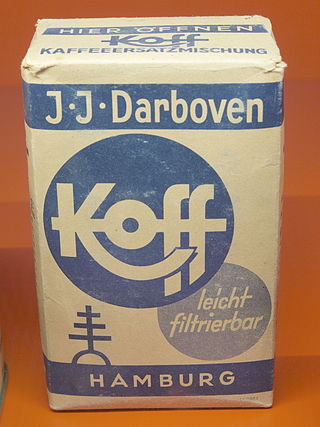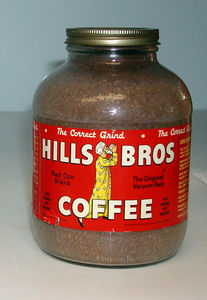
Ethiopian cuisine, which is synonymous with Amhara cultural food, characteristically consists of vegetable and often very spicy meat dishes. This is usually in the form of wat, a thick stew, served on top of injera, a large sourdough flatbread, which is about 50 centimeters in diameter and made out of fermented teff flour. Ethiopians usually eat with their right hands, using pieces of injera to pick up bites of entrées and side dishes.

Seattle's Best Coffee LLC is a subsidiary of Nestlé whose brand is used to sell wholesale coffee, ground coffee, and coffee K-cups. While this brand used to have coffeehouses in the United States, it no longer advertises them on its website. Some of these coffeehouses have converted to Starbucks while Starbucks previously owned this brand. Focus Brands owns the franchising rights for this brand's coffeehouses for international markets and military bases.

Harbour Air Seaplanes is a scheduled floatplane service, tour and charter airline based in Richmond, British Columbia, Canada. The predominantly seaplane airline specializes in routes between Vancouver, Nanaimo, Victoria, Sechelt, Comox, Whistler and the Gulf Islands, primarily with de Havilland Canada floatplanes. Harbour Air operates de Havilland Beavers, Otters and Twin Otters.

Coffee production is the industrial process of converting the raw fruit of the coffee plant into the finished coffee. The coffee cherry has the fruit or pulp removed leaving the seed or bean which is then dried. While all green coffee is processed, the method that is used varies and can have a significant effect on the flavor of roasted and brewed coffee. Coffee production is a major source of income for 12.5 million households, most in developing countries.

Home roasting is the process of roasting coffee from green coffee beans on a small scale for personal consumption. Home roasting of coffee has been practiced for centuries, using simple methods such as roasting in cast-iron skillets over a wood fire and hand-turning small steel drums on a kitchen stovetop.

Timothy's World Coffee is a large Canadian coffee roasting company and chain of coffeeshops.
Matthew Algie is an independent coffee roaster with registered offices at 16 Lawmoor Road, Glasgow, United Kingdom. The company sells its coffee to coffee shops, bars, restaurants, hotels and businesses across the UK & Ireland and also offers coffee machines for hire - supported by a network of field engineers as well as a range of coffee-related equipment and complementary products through its sister-company Espresso Warehouse. Additionally, Matthew Algie also provide SCA accredited barista training courses, taught via their training campuses based in London, Glasgow & Dublin.

Roasting coffee transforms the chemical and physical properties of green coffee beans into roasted coffee products. The roasting process is what produces the characteristic flavor of coffee by causing the green coffee beans to change in taste. Unroasted beans contain similar if not higher levels of acids, protein, sugars, and caffeine as those that have been roasted, but lack the taste of roasted coffee beans due to the Maillard and other chemical reactions that occur during roasting.

Ganges, British Columbia is an unincorporated community on Salt Spring Island in the province of British Columbia, Canada.
Coffee cupping, or coffee tasting, is the practice of observing the tastes and aromas of brewed coffee. It is a professional practice but can be done informally by anyone or by professionals known as "Q Graders". A standard coffee cupping procedure involves deeply sniffing the coffee, then slurping the coffee from a spoon so it is aerated and spread across the tongue. The coffee taster attempts to measure aspects of the coffee's taste, specifically the body, sweetness, acidity, flavour, and aftertaste. Since coffee beans embody telltale flavours from the region where they were grown, cuppers may attempt to identify the coffee's origin.

Coffee substitutes are non-coffee products, usually without caffeine, that are used to imitate coffee. Coffee substitutes can be used for medical, economic and religious reasons, or simply because coffee is not readily available. Roasted grain beverages are common substitutes for coffee.

Hills Bros. Coffee is a maker of packaged coffee, founded in San Francisco.

Salt Spring Island or Saltspring Island is one of the Gulf Islands in the Strait of Georgia between mainland British Columbia, Canada, and Vancouver Island.
The Unseen Bean is a coffee roasting company and café in Boulder, Colorado. Gerry Leary, blind since birth, started selling roasted coffee in 2004, and opened the retail café in March, 2007. Leary, who is also an advocate for the disabled, advertises "blind roasted coffee" to rouse interest in prospective customers. Leary runs the business and roasts coffee with the help of a guide dog, who is also featured on the coffee's packaging; talking thermometers; and timers. He gauges when the coffee beans are roasted by smell and hearing. The Unseen Bean was featured in the 2008 Top of the Town issue of Denver magazine 5280. Leary received training and certification in roasting coffee from the Coffee Training Institute and West Coast Specialty Coffee Company in San Francisco, California.
Third-wave coffee is a movement in coffee marketing emphasizing high quality. Beans are typically sourced from individual farms and are roasted more lightly to bring out their distinctive flavors. Though the term was coined in 1999, the approach originated in the 1970s, with roasters such as the Coffee Connection.
Metropolis Coffee Company is a coffee roasting company, wholesaler, and retailer with locations at 1039 W. Granville Avenue and 3057 N. Rockwell Avenue in Chicago, Illinois. The company supplies coffee to hundreds of cafes and restaurants throughout the U.S., Canada, and Korea. In 2005, they were named by Newcity as the best place in Chicago to buy coffee beans and noted for their donation of $2 to Oxfam for each pound of beans purchased. Metropolis is also a back-to-back winner of the Good Food Awards and winner of Roast Magazine's Roaster of the Year national roasting competition.

Woods Coffee is a regional coffeehouse chain based in the Pacific Northwest, with 20 coffeehouse locations. It is based in Bellingham, Washington, and primarily serves northwestern Washington. The chain was founded in Lynden, Washington, in 2002.
Seattle is regarded as a world center for coffee roasting and coffee supply chain management. Related to this, many of the city's inhabitants are coffee enthusiasts; the city is known for its prominent coffee culture and numerous coffeehouses.

Grounds for Coffee is a locally owned cooperative of coffee shop owners operating in Utah. The first Grounds for Coffee shop opened in Salt Lake City in 1989. The business currently operates as a franchise owned by Dan and Suzy Dailey, with multiple shops located in Ogden, Layton, and Sunset, Utah. One independently owned shop also operates under the Grounds for Coffee name in Clearfield, Utah. Grounds for Coffee also operates a mail-order business via its website, selling fresh roasted coffee beans.

Monmouth Coffee Company is a coffee roaster, retailer and wholesaler in London, which was founded in 1978. It played an important role in regenerating Neal's Yard and Borough Market. It has remained focused on roasting and selling coffee beans and was one of the foundations for the third wave of coffee in London after the year 2000.













